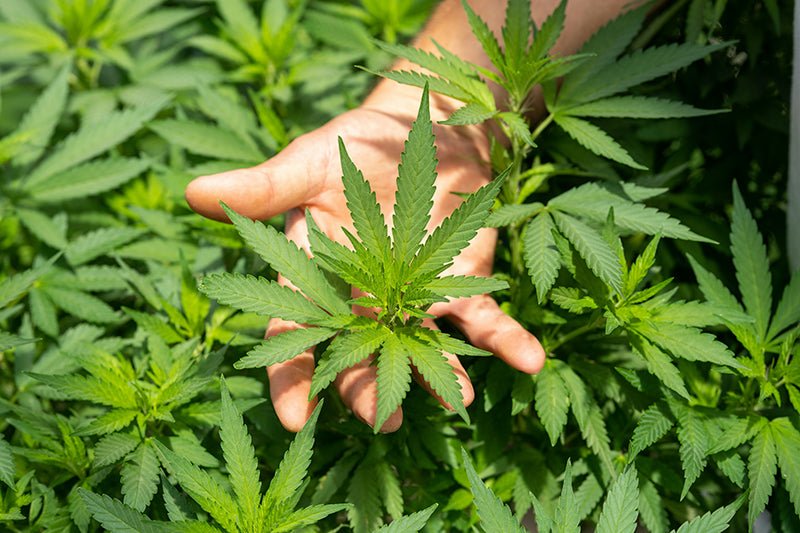What Are Terpenes, and Why Do They Matter in CBD Products?
If you’ve been using CBD, or you’re looking into the different options available, you’ve probably seen the word ‘terpenes’ crop up more than once.
Along with THC, flavonoids, and cannabinoids, terpenes are often mentioned to give people an idea of what to expect from a CBD product, from its aroma and flavour to its potential effects on relaxation and stress relief. But what exactly are terpenes, and why do they matter?
What are Terpenes?
Terpenes are naturally occurring aromatic compounds found in many plants, including CBD flower, with cannabis plants consisting of more than 150 different types.
Each of these terpenes is responsible for providing aromatic diversity, giving different strains their distinctive smells and flavours – ranging from citrusy, piney, and floral to earthy, spicy, or sweet.
Beyond aroma, terpenes also play a role in the plant’s natural defence mechanisms and can influence how cannabinoids like CBD and THC interact with the body, contributing to effects such as relaxation, mood enhancement, and sleep quality.
Where Do Terpenes Come From?
In terms of where they come from, terpenes are produced naturally within the glands of the hemp or cannabis plant, often in the same areas where cannabinoids like CBD and THC are synthesised.
These glands, called trichomes, are tiny, resinous structures that contain the plant’s active compounds: cannabinoids, terpenes and flavonoids. Together, they act to amplify each element’s effect, thereby enhancing the overall impact of the plant’s chemical profile and making each strain unique.
How Do They Differ From Cannabinoids?
You might also have noticed that terpenes are often mentioned alongside cannabinoids, to the point where they start sounding like the same thing. It’s important to note, however, that they serve very different roles.
While cannabinoids like CBD and THC interact directly with the body’s endocannabinoid system – influencing pain, mood, and inflammation – terpenes are primarily aromatic compounds, meaning they provide the smell that makes the plant distinct.
There is, however, the entourage effect. As we mentioned previously, terpenes do act on the endocannabinoid system in a similar way to cannabinoids, but the key distinction is that they’re absorbed and used differently – cannabinoids bind to specific receptors in the system to produce physiological effects, whereas terpenes influence the experience indirectly, modulating how cannabinoids interact with the body.
In other words, they work together to enhance each other’s effects, creating a synergistic interaction that improves the overall experience.
What are the Different Types of Terpenes?
So if 150 different types of terpenes can be found in cannabis alone, what exactly are these types, and how do they contribute uniquely to the plant’s effects? We won’t go into all 150 right now – that would take some time! – but some of the most common terpenes found in CBD products include:
-
Linalool
This is a floral-scented terpene with a lavender-like aroma, often associated with calming and relaxing effects.
-
Caryophyllene
This is a spicy and peppery terpene, with some reporting an anti-inflammatory effect that can help with chronic inflammation and muscle soreness.
-
Myrcene
This is an earthy and musky terpene that might also have muscle-relaxing properties, often contributing to the ‘couch-lock’ effect in some strains.
-
Limonene
This is a citrusy terpene thought to have anti-anxiety properties. Again, the terpene itself doesn’t produce the same physiological effects as CBD, but it can complement them through the entourage effect.
-
Humulene
This is another earthy terpene which is believed to have anti-inflammatory effects, potentially helping to reduce swelling and discomfort.
-
Bisabolol
This is a floral-scented terpene commonly found in skincare products, but it’s also present in certain CBD strains, where it’s valued for its soothing and anti-inflammatory properties.
-
Pinene
This is a pine-scented terpene that is said to support focus and alertness, making it a popular choice for those looking to counteract some of the sedative effects of other terpenes used in CBD products.
Are Terpenes Found in All CBD Products?
CBD itself doesn’t contain terpenes, but many CBD products do. When it comes to CBD isolate, this is pure CBD, which means there are no terpenes unless they’re added back into the product during formulation.
Full-spectrum and broad-spectrum CBD, however, naturally retain terpenes from the hemp plant, contributing not only to the product’s flavour and aroma, but also to the potential therapeutic effects.
Let’s say you’re looking at a product with a ‘banana’ profile. Unless the flavouring isn’t organic, this is likely to have come from terpenes such as myrcene or isoamyl acetate, both of which give hemp strains fruity, sweet, and tropical notes – creating the banana-like aroma and flavour naturally, without the need for artificial additives.
Again, the same terpenes could also enhance the effects of the cannabinoids, which, in this case, might be the promotion of relaxation and stress reduction.
Why Do Terpenes Matter in CBD Products?
Why does this all matter? Essentially, it’s all about the flavour of the CBD flower and the potential effects it could have on your body.
For many people choosing between different plants, they’re considering the whole experience it will provide. That includes the way a strain smells or tastes – one person might prefer more earthy, natural aromas, while another might want something more punchy and sweet – as well as the influence it will have on their sense of well-being.
There are plenty of CBD users, of course, who are using these products for specific purposes. Some may be seeking relief from stress or anxiety, while others might want to improve sleep quality or physical discomfort.
In each of these cases, the terpene profile of a product can make a noticeable difference, which means choosing a product with the right terpene profile is crucial for matching the individual’s needs and preferences.
Conclusion
It might seem like a small thing, but terpenes have a big impact on both the experience and the effectiveness of a CBD product.
That’s why they’re talked about so frequently, and that’s why, if you’re looking for a CBD plant that’s right for you, you should pay just as close attention to the terpene profile as you would any other part of the chemical profile.

